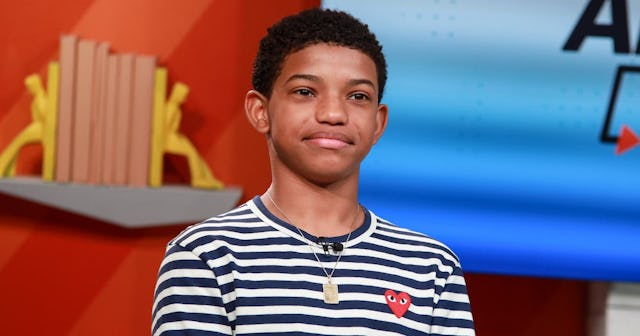12-Year-Old 'This Is Us' Actor Lonnie Chavis Writes Powerful Essay About Racism

If you read any one thing today, make it this powerful essay about race by This Is Us actor Lonnie Chavis
As the country continues to grapple with its racial inequity in the wake of the deaths of George Floyd, Breonna Taylor, Ahmaud Arbery, and countless other Black people killed by police and white people, eyes are being opened to the realities of trying to survive in America while Black. Lonnie Chavis, who is known for his role as young Randall on This Is Us, is just 12-years-old, but has experienced a lifetime of racism. Now, he’s opening up about it in a powerful essay.
“My life matters, but does it?” Chavis writes. “America paints a very clear picture of how I should view myself. America shows me that my Blackness is a threat, and I am treated as such.”
In his essay, Chavis writes about how his parents taught him about his Blackness, by having him watch movies like Amistad and Malcolm X. “I was overwhelmed with confusion, fear and sadness. I had to lean on my faith in Christ for hope, protection and understanding,” he writes.
He goes on to talk about being young and Black and trying to make it in Hollywood all while being treated poorly by security at events until he had a publicist there to announce him, and how he was constantly confused with other Black actors.
“I guess we all look alike since we are all Black,” Chavis writes. “Can you imagine being confused for any other Black kid just because you all share the same profession? I can.”
He also talks about going to a restaurant with his cousins and their parents and being accused by the white woman working the cash register of stealing from her tip jar. It was only after a bystander stepped in and explained that Chavis is a famous actor who doesn’t need a few dollars in tips that the woman believed him.
“Can you imagine someone thinking you are a thief just because of the color of your skin?” he writes. “I can.”
But where the essay gets truly heartbreaking is when Chavis begins to describe some of his parents’ interactions with police that he’s witnessed. Like when his mom was pulled over near the Paramount lot driving her new BMW, and without asking for license or registration, the cop asked, “Whose car is this?” Or when a cop followed the family home on Chavis’s birthday and arrested his father on their doorstep, claiming he was being detained for a traffic ticket.
“I held my baby brother and cried as I could hear my mother yelling outside of our home. I thought my parents were for sure going to die going up against the police,” Chavis writes. “By the grace of God, they are both still with me, and that racially motivated harassment against my father was dismissed. Can you imagine holding on to your three little brothers while thinking that you are all going to be orphans? I can.”
Kevin Winter/Getty Images
The last paragraph of the essay is one of its most powerful: “If you don’t understand what’s going on in the world, then understand this: This is what the world looks like for me. A 12-year-old Black boy. This is my America.”
Chavis continues, “Policies need to change, laws need to change, the police need to change, Hollywood needs to change, hearts need to change, America needs to change. Change has got to happen for unarmed Black citizens to not live in fear of being murdered.”
This is the reality of a 12-year-old boy — a child. This is what being Black in America is like. How can anyone still argue that nothing needs to change?